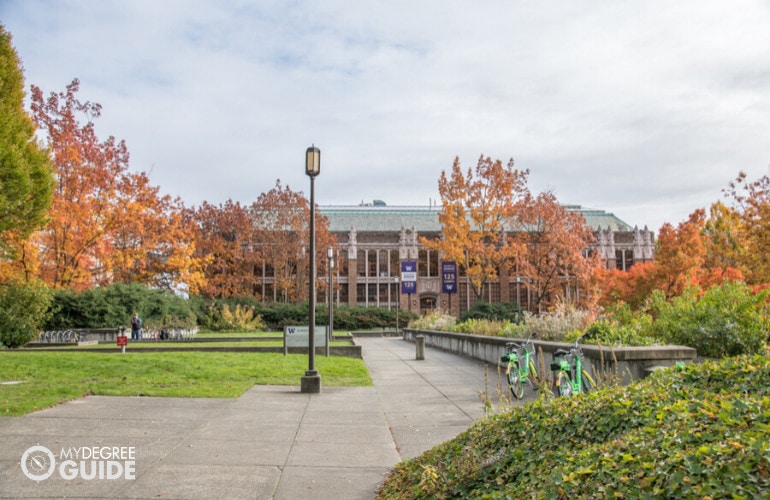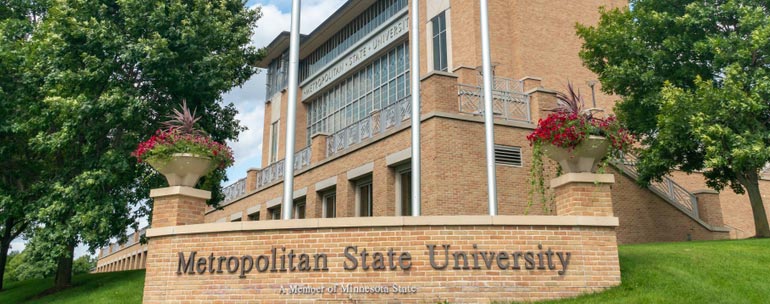Open admission colleges accept all qualified applicants instead of choosing only those with the best grades or the strongest references.

If you are worried about your university qualifications or want to avoid the competitive nature of some college admissions processes, you might consider choosing a school with open enrollment.
Editorial Listing ShortCode:
Let’s take a look at how colleges that accept anyone can help you earn a credible degree and start your higher education journey.
Open Admission Colleges

There are many shows and movies that depict a character jumping through hoops to get into a top college and then waiting anxiously to receive an admission letter. Those high-stress stories may have scared you off from the idea of ever applying to college.
Not every college admission process is like that, though. In fact, there are schools where you won’t have to wring your hands in worry and anticipation at all. They’re called open admissions colleges. Also known as open enrollment colleges, these schools don’t have stringent application requirements.
You don’t have to be the best of the best to get in. Open admission schools typically take any students who have graduated from high school. They accept students who have passed the GED as well. Some may even take students who haven’t finished high school studies.
You may be interested in colleges with open admission if you:
- Are a working adult who wants to streamline the application process
- Feel anxious about the college admissions process
- Got low grades during your last school experience
- Prefer not to feel that you’re competing with other applicants for a spot
- Want to prove you can succeed in college before applying to more selective schools
To get into an open admissions school, you’ll generally be required to fill out an application form. You can usually do this online. There might be a small application fee and an interview with an admissions representative, too.
Editorial Listing ShortCode:
When applying, you’ll likely be asked to submit high school transcripts or a copy of your GED certificate. If you have taken any previous college classes, you’ll turn in those transcripts also.
Once you’ve enrolled in an open admission college, you may end up taking placement tests. These can help the college figure out which classes you should take first. Signing up for courses that match your current readiness level can help you start college on the right foot.
You may earn a certificate, a 2 year degree, or a 4 year degree from an open enrollment college.
Benefits and Shortcomings of Open Enrollment

Picking a school with an open admission policy may seem like a no-brainer, but it’s not necessarily the right choice for everyone.
Before you go that route, it’s beneficial to weigh the pros and cons of open enrollment so you can decide for yourself whether it’s the best choice for you.
Pros:
- Chance to improve GPA. If you struggled in high school, you may find it more difficult to get into a selective university. At a college that admits all students, you can have a chance to bring your grades up. Eventually, your new GPA may help you transfer to a four-year school or join a graduate program.
- Less time spent on applications. Writing essays and tracking down reference letters can be a time-consuming process. Filling out applications for open enrollment schools is usually much faster. You may simply need to fill out an online application and turn in your high school transcripts.
- Lower cost. While it’s not a hard-and-fast rule, open admission colleges often cost less than ones that are more choosy about who enrolls. If you’re on a budget, low tuition costs may be the key to earning a college degree.
- More diverse student body. Often, selective schools attract many students from similar socioeconomic or academic backgrounds. Colleges with open enrollment can level the playing field, so to speak. You may find that the student body is more diverse when it comes to age, wealth, race, academic experiences, and a variety of other factors.
Cons:
- Different academic environment. The highest-performing students often gravitate toward selective colleges. As a result, open enrollment schools often have fewer academic superstars. If you thrive on being challenged by your peers, you might miss being surrounded by top-of-the-class students.
- Fewer student resources. Because colleges with open enrollment often cost less, they may not have as much money to invest in the nicest facilities and the newest technology. If you’re willing to pay more, you may benefit from the increased resources available at more selective—and more expensive—schools.
- Less prestige. You can get a solid education at a regionally accredited open enrollment college. Even still, your degree may not have quite the influence that an Ivy League education would provide. Employers and graduate admissions committees may prefer candidates from more prestigious schools in some cases.
- Academic rigor. An open admission policy doesn’t mean that college will be a piece of cake. Earning a degree will still require work and perseverance. If school has always been a struggle for you, college may not be any different. Unlike in high school, though, you may have the opportunity to pace your studies in college.
You can always decide to apply to several different schools—some with more lenient admissions policies and some with stricter requirements. Once you find out where you’ve been accepted, you can make your final decision.
How to Choose a College with Open Admission Policy

There are many open enrollment colleges out there, but they’re not all of the same caliber. It’s beneficial to select a reputable school that will meet your needs. Here are some factors to consider as you explore schools:
- Accreditation. Choosing an open admission school doesn’t mean that you’ll have to skimp on academics. Regional accreditation shows that a college meets acceptable standards.
- Signs of student success. Most colleges can provide statistics to help you evaluate whether they’re doing a good job of educating students. One figure to consider is the first-year retention rate—the higher the percentage, the better. You can also look for the career placement rate. The majority of graduates should be able to find relevant work after completing college.
- Student resources. If you struggled in high school, you may need a hand with finding success in college. You can take a look at whether a college has introduction-to-college classes, free tutoring, or other programs that could be of assistance.
- Transfer policies. This college may not be the last stop on your educational journey. Some two-year schools have articulation agreements with four-year universities so that graduates are guaranteed full acceptance of all their previous coursework.
- Two-year vs. four-year. You can receive an associate degree or a bachelor’s degree from an open enrollment college. If you want to ease into college life, you may find that getting an associate degree from a community college enables you to build up your stamina for the more challenging courses at many four-year institutions.
Determining which factors are important to you can help you identify the best open enrollment colleges for you.
Open Admissions University Requirements

Getting into a school with an open enrollment policy can be less stressful than applying to highly selective schools. There are usually fewer steps to the application process. Common requirements may include:
- Completed application form with personal information
- Application fee
- Interview with admissions counselor
- School transcripts or GED record
After submitting materials, you may also take placement tests before enrolling in classes. Just like accredited self-paced online colleges, this can help the school know which courses are best for your current level of knowledge.
Accreditation

The best open admissions colleges hold regional accreditation. In other words, they’ve been recognized by an official agency as an institution that meets academic standards.
You can count on a regionally accredited school to provide a robust education. If you complete your studies at a school with regional accreditation, you can come away with a respected college degree.
Editorial Listing ShortCode:
Other schools will recognize the value of the education you earn at an accredited institution, and that can be important if you try to transfer your credits. It can also make a difference for graduate admissions. Regional accreditation can also be beneficial in the job market, as employers tend to have more faith in an accredited degree.
What Is an Open Admissions Policy?

When colleges have open admissions policies, it means that nearly all applicants are welcome to attend.
You don’t need to have the best SAT score or a long list of extracurricular activities. Rather, if you’ve met the academic qualifications—usually a high school diploma or a GED—you can go to school there.
Open admissions schools break down barriers to higher education, but there are a few caveats. For instance, if the school has limited spots, you might get waitlisted for classes. You may also take placement tests to determine your readiness for various courses.
Should I Consider Colleges with Open Enrollment Policies?

Applying to open admissions universities may be a strategic choice for anyone who’s hesitant about the college application process. For example, if the idea of compiling a thick application packet feels overwhelming, going to an open admissions school might be a less stressful alternative.
If you don’t have a strong academic track record, you may also appreciate that your grades won’t keep you out of college. Going to a college that admits everyone could give you a chance to start fresh. Plus, colleges with open admission are often designed with working professionals in mind. Their educational approach may accommodate your busy schedule.
Which Type of College Offers Open Admission?

Most community colleges have open admissions policies. At a community college, you could have the opportunity to earn a two year degree. You might choose to build your career on that degree or to transfer your credits into a bachelor’s degree program.
Some four year colleges offer open enrollment as well. There are both state schools and private universities that take this approach to admissions. There are even some schools that do not have explicit open admissions policies but do have high acceptance rates.
It’s also fairly common for online colleges to accept nearly all applicants. It’s especially common with schools that cater to adult learners.
Another advantage with online colleges is that they offer online college courses you can start anytime, making it easy and flexible to get started on a college career.
Do Community Colleges Accept Everyone?

Most community colleges have open admission policies and admit anyone with a high school diploma or a GED certificate. Schools involved in the government’s Ability to Benefit program may even admit students without high school credentials.
Even if admission is a sure thing, you’re not guaranteed to get into the program of your choice. Schools that reach capacity may put applicants on waitlists. Select programs, such as those related to healthcare, may have more stringent application requirements.
Getting suspended or evicted from a school could also keep you out of community college, at least for a time.
Are Open Admissions Schools Less Respected?

You can earn a respected degree at any college that holds regional accreditation. That doesn’t mean, though, that degrees from open admissions colleges are always as prestigious as those from elite universities. Even still, they can help you get into many grad programs or meet the qualifications for a job.
If you’re concerned about your college’s reputation, you can consider beginning your studies at a two-year school with open admission. Then, after getting your associate degree, you may be able to transfer your credits to a more exclusive four-year institution, where you can graduate with a bachelor’s degree.
Do All Online Colleges Have Open Admissions?
Online colleges come in all stripes. So, while some have open admissions policies, others are quite strict about accepting students. Just because a school holds classes online doesn’t mean that it offers automatic admission.
Editorial Listing ShortCode:
In general, state universities are more likely to offer open enrollment than private institutions. Two-year programs may also be more accepting of all applicants. In addition, you may be more likely to find open admissions policies at colleges that only offer online college classes, rather than those that focus primarily on their on-campus offerings.
List of Open Admission Colleges
Methodology: The following school list is in alphabetical order. To be included, a college or university must be regionally accredited with an open admission policy.

The Academy of Art University offers online programs for students interested in different art fields.
While the programs are online, students are encouraged to visit the campus to meet the professors and complete in-person activities. Applicants may apply year-round using the school’s online application form. High school transcripts must be submitted when applying.
Academy of Art University is accredited by the WASC Senior College and University Commission.

Cameron University offers an open admissions policy for all students interested in receiving an Associate, Bachelor’s, or Master’s degree. Their Academic Advising Center is available to help students find the appropriate majors for their goals and provide admissions, scholarship, and financial aid.
Cameron University is accredited by the Higher Learning Commission.

Dixie State University offers an open enrollment policy for undergraduate students. Those interested in the program must have a high school degree or the equivalent and a transcript from a 2 year degree program. Official ACT or SAT test scores must be submitted to the school when applying.
Dixie State University is accredited by the Northwest Commission on Colleges and Universities.

Granite State College requires those interested in attending the school to be US citizens or eligible non-citizens and have high school diplomas or the equivalent. The school offers rolling admissions, allowing new students to join the school at the start of each new term.
Granite State College is accredited by the New England Association of Schools and Colleges.

Metropolitan State University offers different admissions processes for those who are 19 or younger and those who are 20 or older. Those interested in attending college for the first time must submit academic records, ACT or SAT test scores, and records of their extracurricular involvement during high school.
Metropolitan State University is accredited by the Higher Learning Commission.

New Mexico Highland University offers admission on a rolling basis. Applicants must submit official high school or college transcripts and either SAT or ACT test scores. A team of admissions counselors is ready to assist applicants through the application process. Applicants must have a GPA of 2.0 or higher to be eligible for admission.
New Mexico Highlands University is accredited by the Higher Learning Commission.

Ohio University offers an open enrollment policy for those interested in taking a program at their school. The school does not have specific admission requirements but certain programs do. An online application must be submitted with official high school transcripts or proof of GED to apply.
Ohio University is accredited by the Higher Learning Commission.

Utah Valley University requires first-time students to submit ACT or SAT test scores, copies of their driver’s licenses, and official high school transcripts. Counselors are available to guide students after enrollment. To be eligible for the school, applicants must have a high school diploma or the equivalent.
Utah Valley University is accredited by the Northwest Commission on Colleges and Universities.

Wayne State College requires new applicants to submit official high school transcripts, ACT test scores, and an application. Admissions representatives are available to aid those interested in joining the school. Applicants must have a GPA of 3.0 or higher.
Wayne State College is accredited by the Higher Learning Commission.

Western New Mexico University offers an online admission option. When applying, applicants must submit official high school transcripts or GED scores, ACT or SAT test scores from within the past 5 years, and a FAFSA application. Applicants will be informed of academic decisions by the office of admissions.
WNMU is accredited by the North Central Association of Colleges and Secondary Schools.
List of Open Admission Online Colleges
Methodology: The following school list is in alphabetical order. To be included, a college or university must be regionally accredited and offer degree programs online or in a hybrid format with an open admissions policy.

Bellevue University offers open admission. None of the programs require applicants to submit ACT, SAT, or GRE test scores. To be eligible for admission, applicants must have either a high school diploma or an equivalent degree. Some programs may have additional admission requirements.
Bellevue University is accredited by the Higher Learning Commission.

Bryant and Stratton College offers open admission. The school has admissions advisors to assist interested applicants. Applicants must submit a FAFSA application, a photo ID, a high school diploma or the equivalent, an entrance assessment, a math evaluation, and an English evaluation.
Bryant & Stratton College is accredited by the Middle States Commission on Higher Education.

Clovis Community College offers open admission. Academic advisors are available to assist students. Applicants may submit their applications through email, fax, or mail. When applying, they must submit Accuplacer, ACT, or SAT test scores and their official transcripts.
Clovis Community College is accredited by the Accrediting Commission for Community and Junior Colleges, Western Association of Schools and Colleges.

Coastal Pines Technical College requires applicants to have a high school diploma or the equivalent and official transcripts from all schools attended.
Applicants who were homeschooled are required to submit ACT or SAT test scores when applying. ACCUPLACER placement tests in reading, writing, math, and algebra are required for all applicants.
Coastal Pines Technical College is accredited by the Southern Association of Colleges and Schools Commission on Colleges.

Copiah-Lincoln Community College offers open admission. Applicants must submit official transcripts from all schools attended and either have ACT test scores to submit or complete an Accuplacer placement test. Academic advisors are available to assist applicants with the admission process.
Copiah–Lincoln Community College is accredited by the Commission on Colleges of the Southern Association of Colleges and Schools.

Florida National University offers open-door admission. To be eligible, applicants must have a high school diploma or the equivalent. While they do not need to have SAT or ACT test scores, applicants must complete a diagnostic test. Official transcripts must also be submitted to the school when applying.
Florida National University is accredited by the Southern Association of Colleges and Schools Commission on Colleges.

Frontier Community College offers an open admission policy. While students are guaranteed entrance to the school, select programs have different admission requirements.
Applicants must be 17 years old or older. When applying, applicants must submit an admissions form, official transcripts, and national standardized test scores and complete a pre-entrance physical examination.
Frontier Community College is accredited by the Higher Learning Commission.

Grand Canyon University offers open admission to interested applicants who are 16 years old or older. Official transcripts from all schools attended must be submitted when applying. Admission requirements vary by program, but applicants who do not meet GPA requirements may still be admitted to the school if they have high enough test scores.
Grand Canyon University is accredited by the Higher Learning Commission.

Lewis and Clark Community College offers online admission for new students who have a GPA of 2.3 or higher. Applicants must submit an online application with official transcripts from all schools attended and ACT or SAT test scores. Applicants may sign up to receive information about their enrollment verification through an additional website.
Lewis and Clark Community College is accredited by the Higher Learning Commission.

Liberty University’s admissions process is designed to allow applicants to submit an application in just 5 steps. Applicants must submit official transcripts when applying but the requirement may be waived when transferring at least 12 qualifying credits with a GPA of 1.5 or higher. Each program comes with an online completion program.
Liberty University is accredited by the Southern Association of Colleges and Schools Commission on Colleges.

National American University offers an online application to simplify the admissions process.
To be eligible, applicants must either have a high school diploma or official transcripts from a post-secondary institution. Applicants may transfer qualifying credits from their time studying at a different university or earn credits from qualifying life experiences.
National American University is accredited by the Higher Learning Commission of the North Central Association of Colleges and Schools.

National University offers an online application process for those interested in attending the school. Applicants must complete ACCUPLACER evaluations in mathematics and English and have a high school GPA of 2.0 or higher. Some programs may have additional admission requirements. Student support is available through phone and email.
National University is accredited by the WASC Senior College and University Commission.

Oconee Fall Line Technical College allows interested applicants to apply online with an application fee. When applying, applicants must submit official transcripts from all schools attended and either a high school diploma or the equivalent. Official placement exam scores must also be submitted to the school.
Oconee Fall Line Technical College is accredited by the Southern Association of Colleges and Schools Commission on Colleges.

Rasmussen University has admissions advisors available to assist applicants with the application process.
Applicants must complete an entrance placement exam and submit official transcripts from any previously attended universities and a background check. Students may gain additional credits from transferring qualifying credits from other programs they’ve attended, a self-directed assessment, or military training.
Rasmussen University is accredited by the Higher Learning Commission.

Salem University requires new applicants to have a high school diploma or the equivalent. Additional admission requirements may be required for different programs. Any student who has studied at another institute will automatically be considered a transfer student and may transfer in up to 90 qualifying credit hours.
Salem University is accredited by the Higher Learning Commission.

Stanly Community College requires applicants to complete an online North Carolina Residency Determination Service questionnaire before filling out an application.
Official high school transcripts and placement test scores must be submitted to the school when applying. Some programs have limited enrollment and have additional application requirements.
Stanly Community College is accredited by the Southern Association of Colleges and Schools Commission on Colleges.

Sullivan University offers a number of online programs. Applicants may apply online with a small enrollment fee. ACT or SAT scores and a high school diploma or the equivalent must be submitted to the school when applying. Transfer students may be able to receive additional credits if they have already attended a post-secondary institution.
Sullivan University is accredited by the Southern Association of Colleges and Schools Commission on Colleges.

Walden University offers a number of different online programs, each with its own admission requirements. Most programs require applicants to submit official transcripts from all schools attended, test scores, and a resume along with their application. Many of the programs allow qualifying credits from other schools to be transferred in.
Walden is accredited by the Higher Learning Commission.

West Kentucky Community and Technical College allows applicants to submit an online application.
When applying, applicants must submit ACT or other assessment test scores and copies of their official high school transcripts or GED. Before applying, applicants may complete an online orientation to see if online classes are good for them.
West Kentucky Community and Technical College is accredited by the Southern Association of Colleges and Schools Commission on Colleges.

Wiregrass Georgia Technical College accepts applications through the school’s website, the mail, or direct submission to their office. Applicants must have proof of graduating from high school with a GPA of 2.6 or higher and ACCUPLACER, SAT, ACT, or similar test scores.
Wiregrass Georgia Technical College is accredited by the Southern Association of Colleges and Schools Commission on Colleges.
Getting Your College Degree Online

Yes, you can go to college! You may think that the deck is stacked against you because you don’t have good enough grades for getting into school. With open enrollment colleges, though, that doesn’t need to be a concern. Those schools admit all students—including you!
Online studies can be a great option for students who are interested in open admissions colleges. Many online schools accept all applicants, and online programs are often designed to make education accessible to working adults.
Some universities even offer accelerated online classes, which may help you earn your degree more quickly.
If you’re ready to get your degree, you can start exploring your options for accredited open enrollment programs today!

